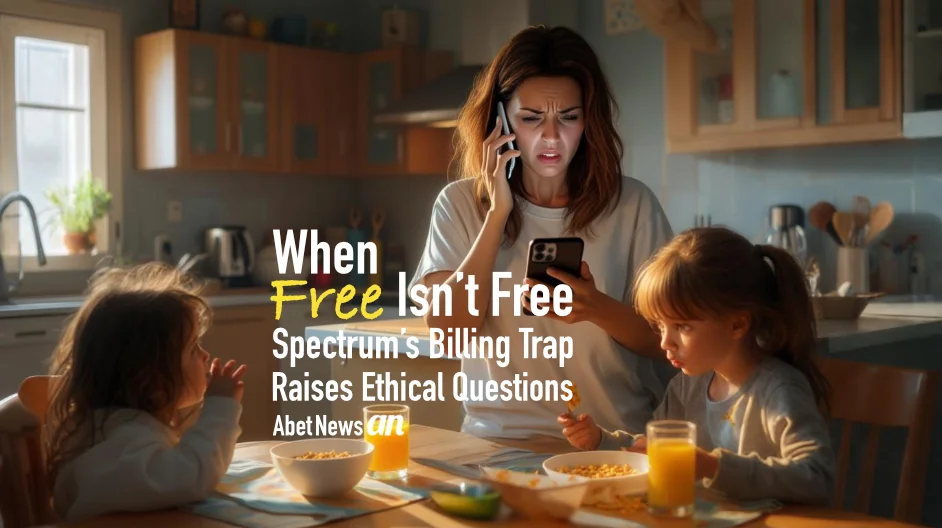When ‘Free’ Isn’t Free

Spectrum’s Billing Trap Raises Ethical Questions
In a world where corporate promises often come with fine print, one recent case involving telecommunications giant Spectrum raises alarming concerns about transparency, consent, and ethical billing practices.
It started as a gesture of goodwill. After a promotional discount expired, Spectrum representatives offered a free mobile service to one elderly couple in an apparent attempt to retain their business. The grandfather, cautious and considerate, initially declined the offer, expressing concern about hidden charges. But the customer service representative reassured him: “It’s completely free,” they said. “There’s nothing to worry about.”
And for a while, there wasn’t.
Until, a year later, Spectrum quietly converted that “free” service into a paid plan—without informing the customers. The only notice? An email bill for $30.
Upon receiving it, the grandfather promptly called Spectrum. Once again, he was told not to worry. The representative assured him the mobile line would be canceled and there would be no charge.
Problem solved? Not quite.
Three weeks later, the couple received another email from Spectrum. This one didn’t offer reassurance—it confirmed that a $30 payment had already been taken for the service they never agreed to keep.
A second call to customer service yielded a troubling revelation: “Once the bill is sent out, there’s no way to reverse it,” they were told. In other words, even though they were misled and had attempted to resolve the issue immediately, Spectrum claimed there was no way to undo the charge.
This situation raises serious ethical questions:
– Is it acceptable for a company to switch a free service to a paid one without explicit customer consent?
– Should companies be allowed to bill customers without prior notice or an option to opt out?
– And once a customer challenges the charge—especially when they do so immediately—shouldn’t they have a right to reverse it?
Spectrum’s handling of this case highlights a larger trend in consumer services: companies using convoluted policies, vague terms, and inconsistent customer support to make money off unsuspecting clients—often the elderly or those less technologically savvy.
Legally, these practices may sit in a gray area. But ethically, they represent a breach of trust, particularly when vulnerable populations are affected. Transparency is not optional in business; it’s a cornerstone of ethical practice. Failing to notify customers about changes in billing or preventing them from correcting unwanted charges crosses a line.
If corporations want to build long-term customer relationships, they need to act with integrity—not treat trust as a marketing strategy.

How to Protect Yourself from Unethical Billing Practices
Situations like what happened with Spectrum aren’t isolated—and they can happen to anyone. Here are a few steps you can take to help protect yourself and your family from surprise charges and unethical billing tactics:
1. Get Everything in Writing
Whenever you’re offered a “free” service or promotional deal, ask for written confirmation—whether by email or on the company’s website. Don’t rely on verbal promises.
2. Review Monthly Statements Carefully
Even if you don’t expect any new charges, always look over your monthly bills. Companies sometimes add new fees or services without a clear explanation.
3. Set Up Account Alerts
Many service providers let you set up account or billing alerts. Enable email or SMS notifications for changes to your plan, new charges, or billing activity.
4. Record Customer Service Calls
While you may need to inform the representative depending on your state’s laws, recording calls (or at least taking detailed notes with names, dates, and reference numbers) can help if you need to dispute charges later.
5. Use a Credit Card, Not a Bank Account
Credit cards often offer better fraud and chargeback protections than debit cards or direct bank withdrawals. If a company bills you wrongly, it’s often easier to dispute it through your credit card issuer.
6. Cancel Unused Services Immediately
If you’re offered a “free trial” or service you don’t plan to use, cancel it right away. Don’t wait and hope it ends on its own—automatic renewals are a common trap.
7. Advocate for Loved Ones
Elderly relatives are especially vulnerable to predatory billing practices. Consider helping them review statements, contact providers, or set up account monitoring.
8. File Complaints
If a company refuses to reverse a charge or changes billing without notice, file a complaint with the FCC, FTC, or your state’s attorney general’s office. Public pressure and formal complaints are often the only way to hold companies accountable.
Helpful Resources for Consumer Protection
If you or a loved one has experienced unethical billing or deceptive business practices, these organizations can help:
• Federal Communications Commission (FCC)
File complaints related to phone, internet, and cable services like Spectrum.
• Federal Trade Commission (FTC)
Report deceptive business practices, unauthorized charges, and misleading promotions.
• Consumer Financial Protection Bureau (CFPB)
Submit complaints about billing disputes, credit issues, or financial services.
• Better Business Bureau (BBB)
File a complaint or research a company’s history of complaints and resolutions.
• Find Your State Attorney General
Contact your state’s attorney general office to report violations or seek state-level assistance.
Have you or your loved ones had similar experiences with hidden charges or unclear service changes? Let us know in the comments. The more we speak up, the harder it becomes for companies to hide behind policies and loopholes.
Amy H.





